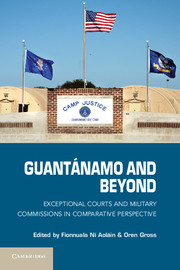Book contents
- Frontmatter
- Contents
- Contributors
- Acknowledgments
- Introduction: Guantánamo and Beyond
- Part I Military Commissions and Exceptional Courts in the United States
- Part II Exceptional Courts and Military Commissions Elsewhere
- Part III International Law, Exceptional Courts, and Military Commissions
- 14 The Right to a Fair Trial in an Extraordinary Court
- 15 Approaches and Responses of the UN Human Rights Mechanisms to Exceptional Courts and Military Commissions
- 16 Exceptional Courts and the European Convention on Human Rights
- 17 The Legitimacy Deficit of Exceptional International Criminal Jurisdiction
- Index
- References
14 - The Right to a Fair Trial in an Extraordinary Court
Published online by Cambridge University Press: 05 June 2014
- Frontmatter
- Contents
- Contributors
- Acknowledgments
- Introduction: Guantánamo and Beyond
- Part I Military Commissions and Exceptional Courts in the United States
- Part II Exceptional Courts and Military Commissions Elsewhere
- Part III International Law, Exceptional Courts, and Military Commissions
- 14 The Right to a Fair Trial in an Extraordinary Court
- 15 Approaches and Responses of the UN Human Rights Mechanisms to Exceptional Courts and Military Commissions
- 16 Exceptional Courts and the European Convention on Human Rights
- 17 The Legitimacy Deficit of Exceptional International Criminal Jurisdiction
- Index
- References
Summary
THE RIGHT TO A FAIR TRIAL IS A FUNDAMENTAL HUMAN RIGHT. This chapter begins by summarizing the basic components and protections of a fair trial as established by international human rights standards. It next examines how fair-trial standards apply to extraordinary courts by looking at both their theoretical and practical application. The essay concludes by suggesting that extraordinary courts present a serious, recurring risk of denying a fair trial to those persons subject to trial and that more must be done to address the gap between norms and practice.
This chapter uses the terms “extraordinary” and “special” interchangeably. Precisely defining an extraordinary court is an elusive task and one that interpretive bodies have largely avoided. The broadest definition of a special court, as Amnesty International uses the term, is that special courts are those procedures that try categories of people on the basis of special legal status (such as juveniles or suspected terrorists) or particular categories of offenses. Another potential definition characterizes special courts as those tribunals that lack certain guarantees of independence and impartiality. It would, however, be circular reasoning to define a legal proceeding as lacking impartiality and independence and then to evaluate those same procedures for their independence and impartiality. This chapter uses the terms extraordinary and special courts more narrowly to describe domestic courts specifically created to try offenses related to state security (broadly conceived), the use of military courts to try civilians, or where governments themselves categorize the procedures as special. Many of these courts suffer from procedural defects, including a lack of such fundamental attributes as independence and impartiality.
- Type
- Chapter
- Information
- Guantánamo and BeyondExceptional Courts and Military Commissions in Comparative Perspective, pp. 305 - 320Publisher: Cambridge University PressPrint publication year: 2013



